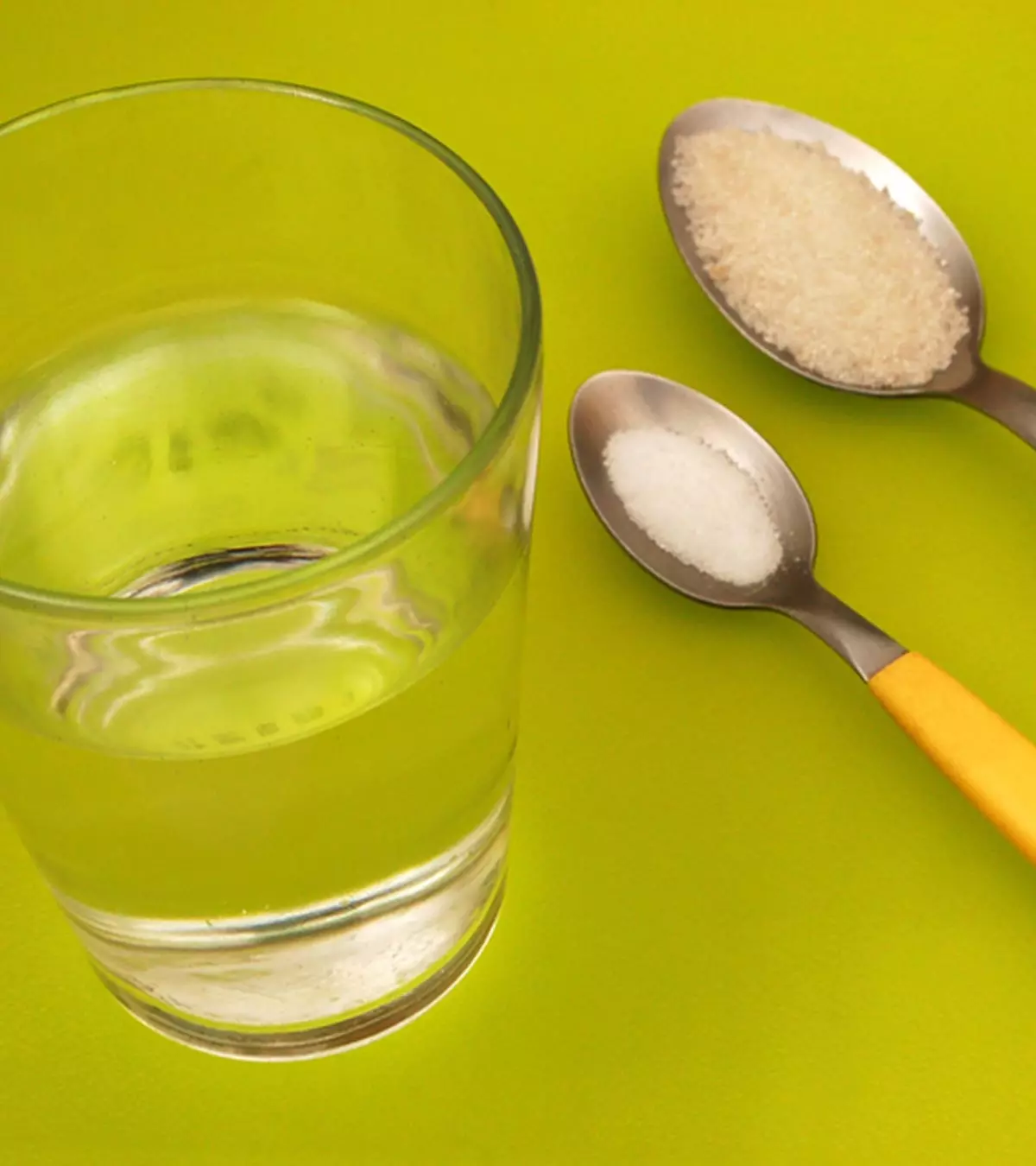
Image: Shutterstock
Constipation is a common problem in pregnancy, and so many women want to know about the safety of magnesium citrate in pregnancy.
Magnesium citrate is a laxative that helps you relieve constipation. It loosens the stool by drawing water from the intestines through osmosis. However, it is a pregnancy category C drug, so there are no evidence-based human studies. You may treat your gestational constipation by lifestyle modifications such as indulging in physical activity, drinking enough water, and adding more fibers to the diet. However, if these measures are not relieving the issue, seek a doctor’s help for pregnancy-safe laxatives or stool softeners. Read on to know more about the uses and risks of magnesium citrate in pregnancy.
Key Pointers
- Pregnant women should take magnesium citrate under medical supervision and are generally advised to deal with constipation.
- The recommended dosage of magnesium citrate for pregnant women is at least 300 mg.
- Excessive consumption of magnesium citrate may lead to side effects like nausea, abdominal cramps, and diarrhea.
- Consuming enough fiber, mild physical activity, and adequate fluid intake may help with constipation without medication.
What Is Magnesium Citrate?
Magnesium citrate is the salt of magnesium
. It is a saline laxative, which increases water content in the small intestine to produce a bowel movement. It is also called an osmotic laxative as it retains water in the stools for easy bowel movements. Magnesium citrate also increases stool’s bulk with the increased water content.
Upon intake, magnesium citrate can either be effective within 30 minutes or may take up to three to six hours to show results. Mineral supplements such as magnesium citrate may be beneficial for both maternal and fetal health. Magnesium citrate is also administered to patients before colonoscopy or other surgeries. It is available as Citrate of Magnesia and Citroma.
 Quick fact
Quick factIs Magnesium Citrate Safe During Pregnancy?
There are no known risks to pregnant mothers and fetal health due to the use of magnesium citrate. But if you are pregnant, consult your doctor before you use magnesium citrate as its use can produce certain side effects. If your doctor approves its use, you may take magnesium citrate as recommended.
Magnesium citrate is FDA-approved. But it falls under category C, which means there are no sufficient human studies available on it yet. Category C also means that in animal studies, magnesium citrate produced adverse effects on fetal health. However, its use may be beneficial during pregnancy and cause minimal or no risks.
Magnesium citrate can also aid in calcium absorption, an essential mineral for fetal bone growth and development, while promoting healthy digestive system functioning in expectant mothers.
 Did you know?
Did you know?Side Effects Of Magnesium Citrate During Pregnancy
The use of magnesium citrate while pregnant can produce certain side effects.
- Nausea
- Mild abdominal cramps
- Gas
- Bloating
- Diarrhea
- Electrolyte imbalance
Serious side effects from magnesium citrate use are unlikely but possible. At times, high doses or long-term use of the drug can also cause severe side effects.
 Be watchful
Be watchfulSevere Side Effects:

Image: IStock
- Irregular heartbeat
- Mood changes
- Drowsiness
- Persistent diarrhea
- Confusion
- Muscle weakness
- Rectal bleeding
- Blood in stools
- Severe abdominal pain
You may also experience dehydration due to severe diarrhea
. Dehydration may cause dizziness, dry mouth, decreased urination and weakness. Dehydration can also pose risks to fetus development. Therefore, even though magnesium citrate is considered safe to use during pregnancy, it may produce side effects that can harm fetal health and cause pregnancy complications.
Also, use magnesium citrate with caution if your doctor has put you on a diet with low sodium content (1)
Magnesium Citrate And Drug Interactions During Pregnancy

Image: Shutterstock
Magnesium citrate may interact with some drugs. Therefore, its use must always be under caution. As magnesium citrate is an over-the-counter (OTC) medicine, everyone may not be aware of its interactions with drugs. If you are pregnant, refrain from using it without knowing all precautions recommended with its use.
Magnesium citrate may interact with the following drugs:
- Digoxin (used for heart conditions)
- Eltrombopag (used for increasing platelet counts)
- Sodium polystyrene sulfonate (used to lower excess potassium content in the body)
- Antibiotics such as ciprofloxacin, doxycycline, tetracycline, minocycline and levofloxacin.
- Other drug interactions are also possible.
Saline Laxatives During Pregnancy
- If you are pregnant, use saline laxatives only if your doctor recommends its use as a last resort for your constipation treatment. In any case, use it only once or twice. Saline laxatives like magnesium citrate and others are available as OTC drugs, and there are no known side effects with its use during pregnancy. Therefore, you may assume its use would be alright to use for your digestive health without asking your doctor. But such a thing is not advisable for pregnant and lactating women. If you suffer from kidney problems or bowel disease, saline laxatives may do you more harm than good.
- Expectant mothers with kidney problems are generally advised to avoid all kinds of saline laxatives during pregnancy, including magnesium citrate.

Image: Shutterstock
- During pregnancy, use saline laxatives only after you know the full range of the drug’s benefits and side effects as per your health condition.
Constipation And Pregnancy
Constipation is a major problem during pregnancy. Most women experience constipation at some point during their pregnancy. The reasons are increased hormonal changes, and the increased pressure of your growing uterus on your intestines, changes in diet, certain medicines like iron dietary supplements, etc.
Brandi, a mom and blogger shares her experience with pregnancy constipation, ‘’I would venture to say that being pregnant and constipated is worse than childbirth. If you’ve had constipation before, you might know it to be an inconvenience. It’s uncomfortable and a nuisance, but you eventually get through it. Pregnancy constipation, however, is a whole other beast (ⅰ).’’
Using Laxatives During Pregnancy
It is tempting to use laxatives to get some relief from persistent constipation problems during pregnancy. But know that some OTC laxatives are better to use during pregnancy than others. For instance, stimulant laxatives like cod liver oil or castor oil are not considered safe to use during pregnancy. Also, laxatives may always not be effective and may produce side effects.
Before you use laxatives during pregnancy, try to use natural ways to find relief from constipation. If you suffer from constipation and planning your pregnancy, you can ask your doctor about solutions beforehand. This way you can be better prepared to tackle constipation during pregnancy.

Image: IStock
Some helpful measures
- Include more fiber in your diet. Eat more fruits, vegetables, and whole grains.
- Keep your water and fluid intake optimum. Lack of water often causes constipation.
- Continue some physical activity during pregnancy after a consultation with your doctor. Physical movement is beneficial for bowel health. Even moderate walking may be beneficial for your bowel health during pregnancy.

Image: IStock
- Discontinue or reduce the dose of your iron supplements and use food sources for your body’s iron needs.
- If you suffer from persistent constipation, ask your doctor for laxative recommendations that you can use during pregnancy for long-term. Certain bulk-forming laxatives are considered safe to use.
Frequently Asked Questions
1. How much magnesium citrate can a pregnant woman take?
Pregnant women are recommended to take at least 300mg of magnesium citrate daily (2)
2. Can magnesium citrate cause miscarriage?
Although magnesium supplementation has no known adverse effects on pregnancy outcomes and fetal growth, speak to your OB/Gyn before taking magnesium citrate or other magnesium supplementations (3).
3. Which form of magnesium is best for pregnancy?
Magnesium chloride and magnesium citrate are the best options for magnesium supplementation because they are available as liquid supplements, helping them get absorbed easily (4).
4. What are the dietary sources of magnesium for pregnant women?
Some magnesium-rich foods a pregnant woman can eat are leafy green vegetables, legumes, nuts and seeds, whole grains, tofu, beans, yogurt, and dark chocolate (4).
5. Can magnesium citrate help with morning sickness?
While magnesium can support overall health, magnesium citrate cannot help with morning sickness in pregnancy. In fact, nausea and vomiting are the side effects of taking magnesium citrate.
6. What should I do if I miss a dose of magnesium citrate?
If you are on a scheduled dosing of magnesium citrate and missed one, you may take the missed dose as soon as you remember. But, if it is close to the time of the next dose, skip it and continue with your regular schedule. It should be noted that magnesium citrate is not for regular use (5).
Constipation is common during pregnancy and may cause discomfort. However, you should be cautious with the use of laxatives during this time as they may have adverse effects. Magnesium citrate in pregnancy is usually considered a safe antenatal care supplement, but it is better to consult a doctor to know the accurate dose. Excess consumption may cause side effects such as nausea, bloating, and stomach pain. It may also have drug interactions with medications that you may be taking. Try relieving constipation through lifestyle modifications and avoid self-medication when pregnant.
Infographic: Potential Side Effects Of Magnesium Citrate During Pregnancy
Magnesium citrate is an osmotic saline laxative used to remedy constipation and increase magnesium content in the blood. However, it is important to know how safe it is, especially when taking it while pregnant. The following infographic highlights possible complications of magnesium citrate during pregnancy.

Illustration: Momjunction Design Team
Illustration: Magnesium Citrate During Pregnancy - Everything You Should Know

Image: Dall·E/MomJunction Design Team
If you are wondering how often you should take Magnesium citrate, this video is for you. Learn about this important supplement and how often it should be consumed.
Personal Experience: Source
MomJunction articles include first-hand experiences to provide you with better insights through real-life narratives. Here are the sources of personal accounts referenced in this article.
ⅰ. Being pregnant and constipated is worse than childbirth.https://mamaknowsitall.com/pregnancy-constipation/
References
- Center For Drug Evaluation And Research.
https://www.accessdata.fda.gov/drugsatfda_docs/nda/2012/202535Orig1s000MedR.pdf - Carla Adriane Leal de Araújo et al.; (2020); Oral magnesium supplementation for leg cramps in pregnancy—An observational controlled trial.
https://journals.plos.org/plosone/article?id=10.1371/journal.pone.0227497 - Maria Makrides et al.; (2014); Magnesium supplementation in pregnancy.
https://www.ncbi.nlm.nih.gov/pmc/articles/PMC6507506/ - Magnesium.
https://hsph.harvard.edu/department/nutrition/ - Magnesium Citrate.
https://wa.kaiserpermanente.org/kbase/topic.jhtml?docId=d01008a1 - Magnesium citrate Pregnancy and Breastfeeding Warnings
https://www.drugs.com/pregnancy/magnesium-citrate.html - Magnesium Citrate and Oxide: Benefits Dosage and Side Effects
https://www.dietvsdisease.org/magnesium-citrate-oxide-benefits-dosage/
Community Experiences
Join the conversation and become a part of our nurturing community! Share your stories, experiences, and insights to connect with fellow parents.
Read full bio of Dr. Karla S. Sanchez-Banos
Read full bio of Ria Saha
Read full bio of Swati Patwal
Read full bio of Lorraine Teron






















